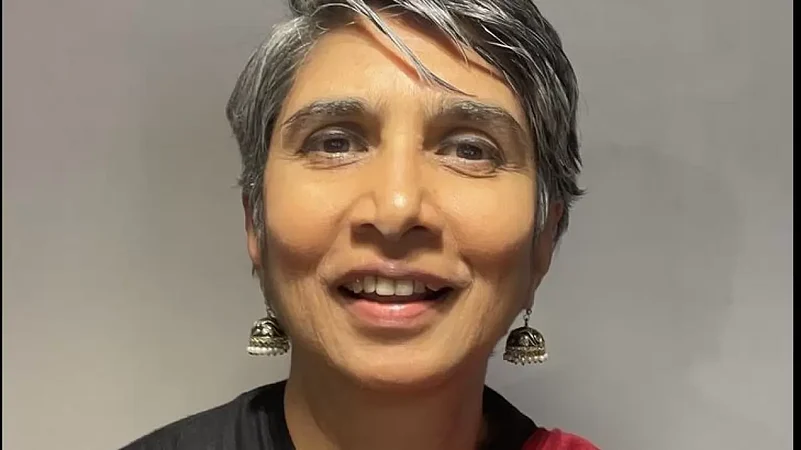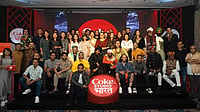Meenakshi Shedde, India and South Asia Delegate to the Berlin International Film Festival, and independent film critic and curator, was recently invited to the 80th Golden Globe Awards as an International Voter. It is a milestone in India’s voting presence in prestigious international film circles, as Meenakshi Shedde is the only International Voter selected from India this year.
The Hollywood Foreign Press Association (HFPA), which gives the awards, has invited 103 new international voters from 62 nations worldwide this year. The idea was to double the number of voters and expand globally, while increasing diversity.
In this interview with Outlook, Shedde speaks about the moment she got the news, how this move of adding diversity was a welcome change, especially when the Golden Globes made news for lack of diversity, and how Indian films have been increasingly accepted at these platforms with open hands- case in point being how ‘RRR’ got two nominations at the Golden Globes.
Excerpts from the interview:
Q. Congratulations Meenakshi Shedde for the invitation to the 80th Golden Globe Awards as an International Voter. You are the only Indian invited from 103 new voters from 62 nations this year so would you like to take us through memory lane and recall the moment when you got to know about this?
Thank you so much! It is a huge honour for me to be the only Indian invited as a Golden Globe Awards International Voter, from 103 new voters in 62 nations this year, by the Hollywood Foreign Press Association (HFPA), headquartered in Los Angeles, US. I had just returned to India in end-August, after a hectic tour of Canada—where I had presented the ‘Satyajit Ray, His Contemporaries and Legacy’ retrospective for which I was Curator, at the Toronto International Film Festival’s (TIFF) Cinematheque, followed by a four-city tour of the US. That’s when I received the email from Helen Hoehne, President, HFPA, confirming my selection. I was delighted, as it topped an already exciting trip.
Q. Is there any process that needs to be followed to be part of the list of international voters ? If yes, when and how did you approach the awards?
I didn’t approach anyone. The HFPA, keen to expand its voters beyond the US, as well as aim for gender equality and diversity, put out a call inviting applications for International Voters through FIPRESCI, the International Federation of Film Critics worldwide, routed through the India branch, of which I am a member, as well as other journalists’ and critics’ bodies. So I responded by sending my application in a rush, as I was about to leave for Toronto and the US, and forgot all about it until the confirmation arrived. I am grateful to the Golden Globes, as well as FIPRESCI for the opportunity.
Q. In the time when Golden Globes is attracting headlines for lack of diversity in HFPA, how do you think this move is going to change the entire dynamics of the award function now?
All the three big film awards organisations—the Academy of Motion Picture Arts and Sciences- the Oscars, the Golden Globes and the British Academy of Film and Television Arts (BAFTA)s were accused of being highly skewed, with mainly white, senior, male voters, which often translated into largely male, white-dominated award winners. All three, including the Golden Globes, have taken measures to ensure a more gender balanced, ethnically diverse and inclusive voter base, and updated regulations. The Golden Globes’ total voting body, including 103 new international voters from 62 nations, now actually has a majority of women voters (52%) and 51.8% racially and ethnically diverse voters, including LGBTQIA+ voters, which is quite an achievement. This diversity of voters globally has translated into a degree of global diversity in the nominations announced on December 12, with films and talents from various nations. This includes SS Rajamouli’s RRR from India earning two nominations, for Best Film-Non English Language and Best Original Song-Film for Naatu Naatu, composed by MM Keeravani, with lyrics by Kala Bhairava and Rahul Sipligunj.
Q. Do you think this was a much needed step and welcome too ?
Absolutely yes, it is very welcome, especially considering it is the 80th year of the Golden Globes. It is also significant as one of the few awards to recognise both motion picture and television achievements. The 80th Golden Globe Awards ceremony for the winners will take place on January 10, 2023, at 8 p.m. ET in California, and be telecast live on NBC and Peacock.
Q. The HFPA, which has 96 members in over 55 nations, is one of the few awards ceremonies to recognise both motion picture and television achievements, so do you think this inclusivity and diversity in the list of members was something that the body has to implement long back and not now?
All the three main film awards bodies had fallen short, but have since made amends. But I imagine it will take some years to see the full impact of this diversity and gender equality reflected in the Golden Globe Awards.
Q. You have been on the international juries of over 25 film festivals including Cannes, Berlin and Venice Film Festivals and now the Golden Globes, and as someone who represents India, how do you see Indian films have been accepted at the global platforms in recent times?
Initially, festivals did not take Bollywood and mainstream Indian films too seriously, but in recent decades all the major A-list festivals and most awards have included mainstream Indian films. The Berlin Film Festival, for whom I am India and South Asia Delegate, for instance, has regularly included in its mainly arthouse programme, mainstream Indian films like Om Shanti Om, Kal Ho Naa Ho, Dil Se, My Name is Khan and Don-The King is Back, among others. And of course at the Golden Globes, RRR has earned two nominations for Best Film-Non English Language and Best Original Song-Film for Naatu Naatu.
Q. Do you think the film industry across the globe is finally accepting the kind of talent Indian film or filmmakers have in terms of producing cinema that reaches the globe? The most significant changes you have seen now that truly echoes this sentiment?
It has been a long journey for Indian cinema to gain acceptance globally. Partly, we have ourselves to blame: India is one of the largest domestic film markets in the world, so traditionally we have rarely pushed ourselves globally beyond diaspora markets, until recent decades. But that is certainly changing, partly because Indian filmmakers are becoming more ambitious, and have a greater awareness of world cinema, especially in the post-Covid OTT-dominated world; some films are also backed by Hollywood offices in India, and all this informs their films. At the Berlin Film Festival, for instance, Farhan Akhtar’s Don, starring Shah Rukh Khan, played in the International Forum of New Cinema, the more experimental section of the festival. But Shah Rukh Khan has been so popular at the Berlinale, that his subsequent Don-The King is Back played in the Berlinale Special, the very high profile, glamorous section, and was an Indo-German co-production, backed by the Medienboard Berlin-Brandenburg.
Q. As someone who keeps a close eye on the Indian movie making industry, where do you think are still chances of improvement and aspects that we as a film body have to unlearn?
Our scripts are mostly still not strong. We don’t trust the intelligence of our audience, and like to explain each point in three different ways. Nor do we respect writers: most film trailers have the scriptwriter’s credits buried at the end, after crediting the publicity head, trailer maker, lyric writers of five songs, colour correction, media director…boss, without a script, you don’t have a movie, remember? India is also still largely lagging in the sync sound department. And often, there has been a lack of accountability over many years, by the juries deciding which films to choose for the Oscar or Indian Panorama: their choices show they have rarely studied which films get selected at the Oscars and why, or which Panorama films have got selected at top festivals, to guide their choices. So when Nadav Lapid, chairperson of IFFI’s international jury, called The Kashmir Files “vulgar and propaganda”, the response was to flip into combative denial mode.


























